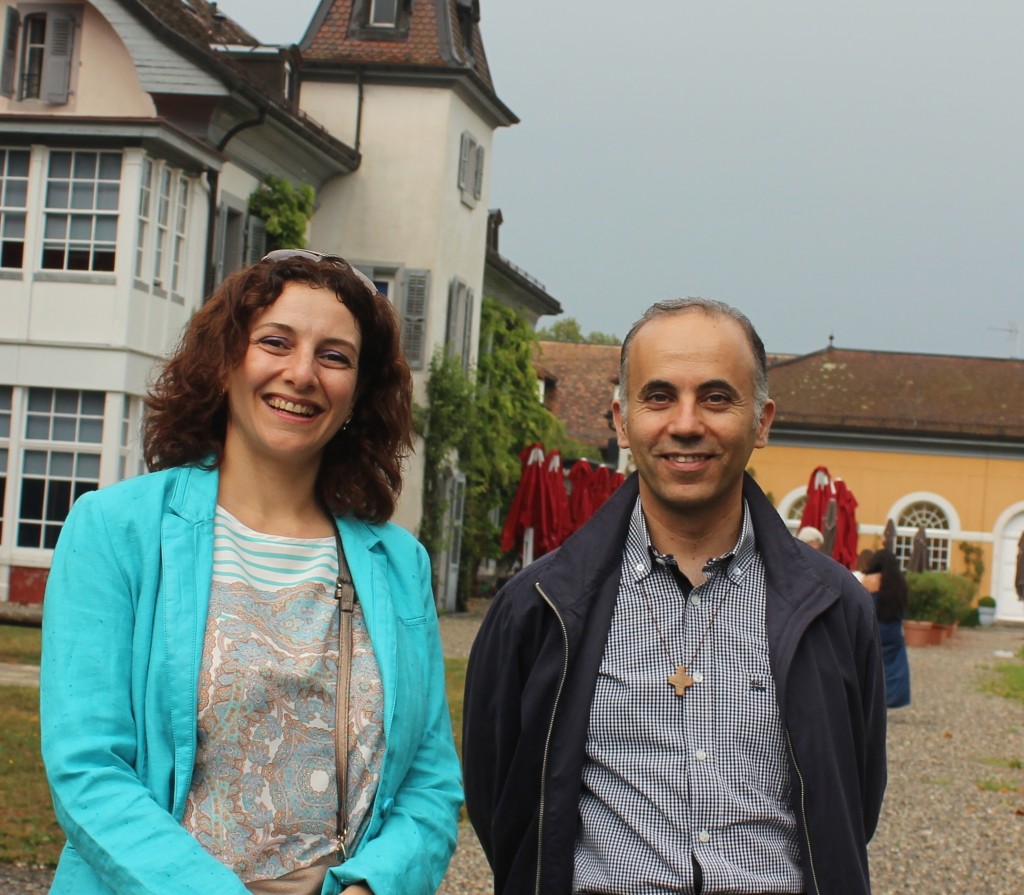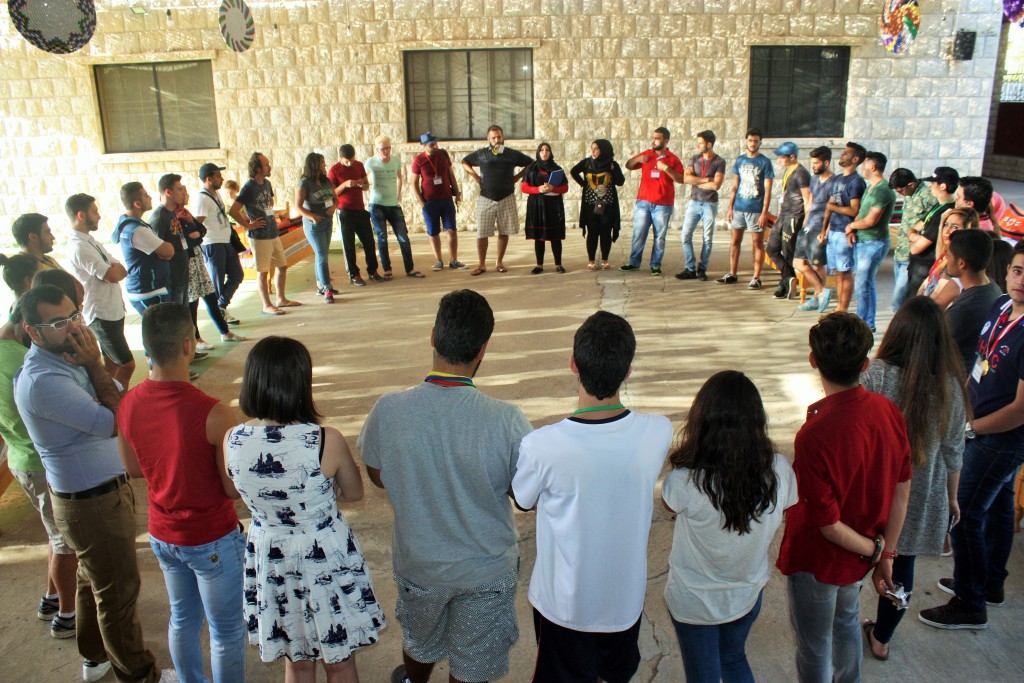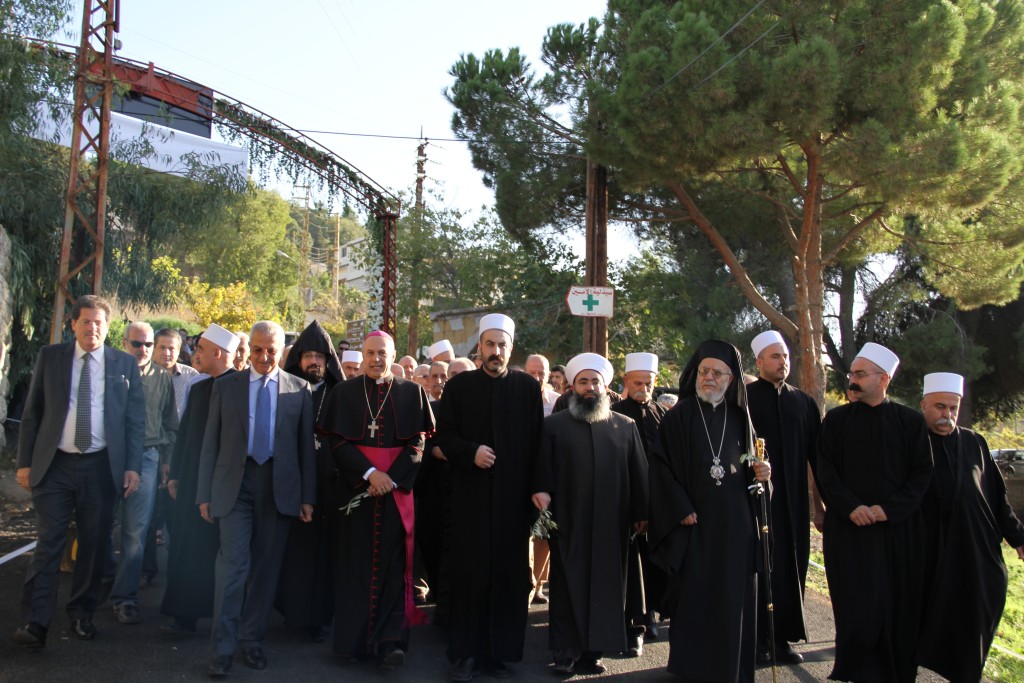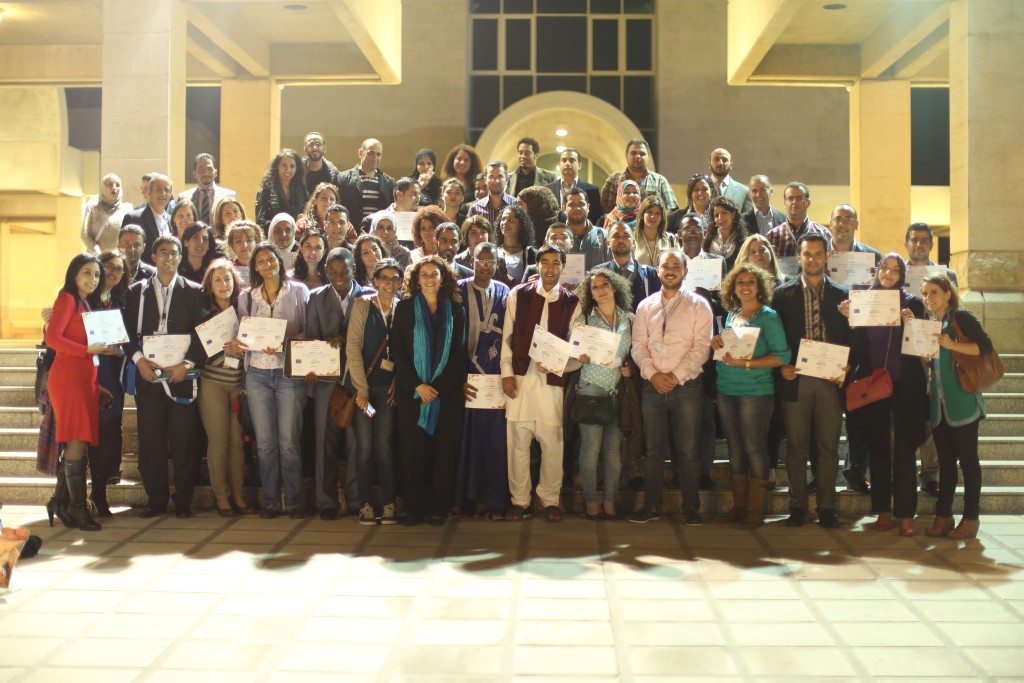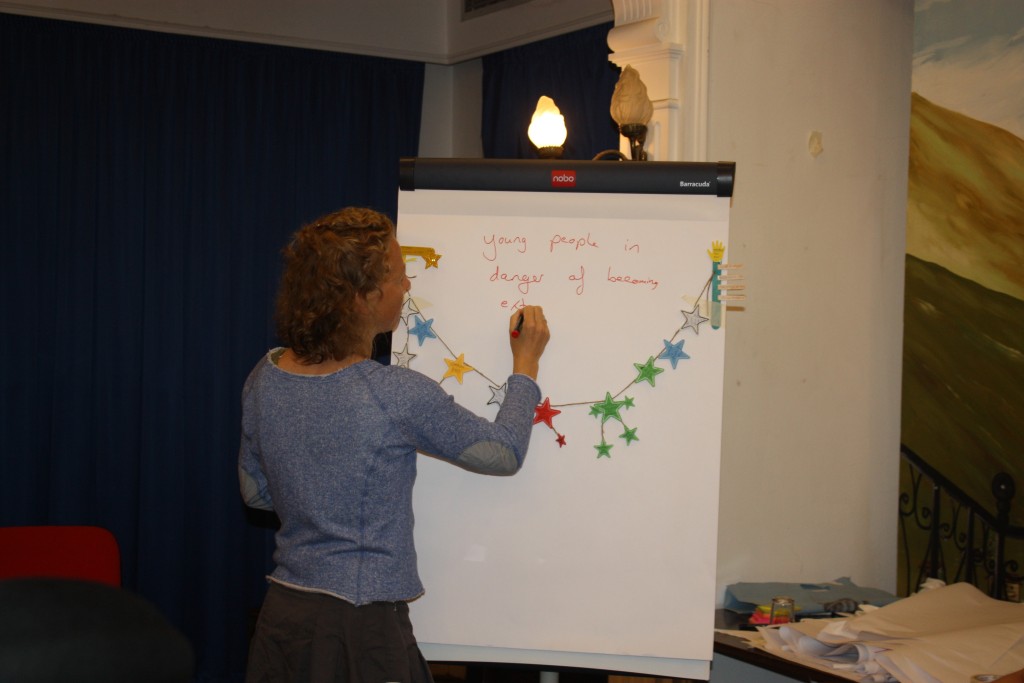Adyan Foundation: An interfaith approach to peace building in Lebanon
11 September 2015Interview with Rev. Prof. Fadi Daou and Dr. Nayla Tabbara, Adyan Foundation, Lebanon
Lebanon is a country where Christianity, Islam and Judaism meet together. The history of this beautiful country has proved to be turbulent. Peace and coexistence between people of different faith were challenged by a period of war, massacres and Beirut became the centre of a violent conflict. Pemptousia in the context of the section “Person and Violence” presents Adyan, a Lebanese foundation (non-profit and NGO) for interreligious studies and spiritual solidarity that was founded on 6 August 2006 by members of Christian and Muslim denominations. It is an independent organization that operates in Lebanon and abroad, regionally and internationally. Through three poles (Adyan Institute, Adyan Community and the Media department) it implements its different cultural, educational, social and spiritual programs. It also works on fostering peace, social cohesion and spiritual solidarity between individuals and communities, through positive relations, objective understanding and shared commitment. Adyan values are: religious diversity, individual itineraries, partnership and spiritual solidarity, peace and social justice and it works with professionalism and objectivity, authenticity and transparency, courage and perseverance, creativity and sustainability. Besides the support of its members, the foundation also benefits from the commitment of its networks, friends and honorary members, as well as its highly qualified professional team. The work of Adyan has been praized with awards: Second Prize of “Living Together Peacefully in a Diverse World” from the United Nations Alliance of Civilizations and the Republic of Azerbaijan, for its Alwan, school program for Education on Citizenship and Coexistence (2013), the Federation of Lebanese NGO’s “Wahdatouna Khalasouna” Civil Peace Award (2011), Berytech Award for the “Best Professional Project of the Year” (2008).
We have the honour to interview two focal members of Adyan: the Chairperson and CEO of Adyan Foundation Rev. Prof. Fadi Daou and the Vice Chairperson of Adyan Foundation and Director of the Adyan Institute Dr. Nayla Tabbara. Rev. Prof. Fadi Daou is a Professor of Interreligious Dialogue and Geopolitics of Religion at Kaslik University – Lebanon and a Consultant on Middle-Eastern issues and Christian-Muslim relations to many international organizations. A Coordinator of the interreligious and ecumenical relations at the Maronite Patriarchate, he is the author and editor of a number of books and articles among which: Education on Coexistence in the framework of inclusive citizenship (2012), Divine hospitality: Christian and Muslim Theologies of the other, (co-author with Nayla Tabbara – 2011), Reconciling Ethics and Politics: The role of Theology (2008). Dr. Nayla Tabbara holds a PhD in Science of Religions (from Ecole Pratique des Hautes Etudes -Sorbonne and Saint Joseph University) and is a university professor in Religious and Islamic Studies. She has publications in the fields of Islamic theology of other religions, Education on interreligious and intercultural diversity, Qur’anic exegesis and Sufism, and works on curricula development (formal and non-formal) on multifaith education and intercultural citizenship. Among her publications are: Divine hospitality: Christian and Muslim Theologies of the other, (co-author with Fadi Daou – 2011); and What about the other: a question for intercultural education in the 21st century (2012).
The two esteemed members of Adyan are interviewed about the circle of violence in the Middle East and more particular in Lebanon, the role of faith and religion (part 1 of the interview), highlighting the role and activity of Adyan (part 2 of the interview).
Interview questions: Dr. Maria Chr. Alvanou
Interview part 1
Q: Lebanon is a land where Muslims and Christians live together. In the past it was characterized as one of the most progressive and modern Middle East countries. How was this achieved?
A- Rev. Prof. Fadi Daou & Dr. Nayla Tabbara: Lebanon is a country where 18 historic communities, falling under 3 religions, Christianity, Islam and Judaism, have a long history of coexistence, without the predomination of a community over the others.
The modernity in Lebanon is rooted in its history since the 16th and 17th centuries, when Mount-Lebanon succeeded to have some autonomy from the Ottoman ruler, and entered in contact with the European Renaissance movement through economic and cultural exchange and the introduction of the modern education.
These two points make from Lebanon a beacon of freedom, and most importantly freedom of speech and of ideas, still prevalent in the Press and in the Publications in Lebanon, as well as an example of diversity and inclusive citizenship. The Lebanese Constitution is in fact unique in the entire Middle East for it does not refer to any specific religion or community in particular, but highlights diversity. Article 9 of the constitution states that: “There shall be absolute freedom of conscience. The state in rendering homage to the Most High shall respect all religions and creeds and shall guarantee, under its protection, the free exercise of all religious rites provided that public order is not disturbed.”
Q: Today there are many sources of conflict in the Middle East and Lebanon has been tormented by extremist violence. How do you see the situation, especially in regard with the balances between religious groups?
A- Rev. Prof. Fadi Daou & Dr. Nayla Tabbara: Today in the Middle East there are a number of parallel dynamics. On the one hand, the dynamic of change of the youth of the Arab spring and their belief in citizenship, in human rights, and in diversity.
On the other hand, the different conflicts of the region that can be summed up into two major conflicts: the 77 year old Arab Israeli conflict that affects the region and that affects Lebanon directly, and the current situation in Iraq and Syria with the ISIS phenomenon and the sunni-shiite conflict.
Although both conflicts have a religious dimension, yet we believe that the needed solutions should be political, where justice and dignity with respect of diversity are guaranteed for all. This requires a new vision of the society based on the promotion of social justice and on intercultural citizenship, i.e. citizenship that is inclusive of religious and cultural diversity.
Q: What are the common bonds or ground between Christians and Muslims in Lebanon and moreover globally in order to achieve a world without violence?
A- Rev. Prof. Fadi Daou & Dr. Nayla Tabbara: After years of working on the common grounds in belief between Christianity and Islam, namely the belief in one and the same God, the belief that God enters in conversation with us humans throughout history through prophets and revelation, and that he enters in conversation with us personally, and the belief that we return to God, and after celebrating yearly for the past 9 years a common value through Adyan’s annual Spiritual Solidarity Day (unity, mercy, brotherhood, reconciliation, repentance peace, brotherhood, hospitality..), Adyan has moved in the past years on working on public life values with the religious authorities representing all denominations in Lebanon.
Within the project entitled Interreligious Education on Intercultural Citizenship (IIC), Adyan works for the promotion of the shared values of citizenship through an interfaith collaboration. Through the establishment of a network of experts in charge of religious education in the national religious institutions, the development of Toolkits for Christian and Muslim religious education on intercultural citizenship values to be integrated in religious education programs in schools and Training for religious educators and preachers on this toolkit, Adyan provides religious leaders and educators with resources about inclusive citizenship and democracy, based on the fundamental public values and rooted in a faith-based repertoire. This allows society to benefit from the support and influence of religious leaders giving faith-based credibility to the public and democratic values on the one hand, and on the other hand the religious teaching and religious discourse is enriched by this social and interfaith chapter and experience, making of this experience a model to be replicated with proper adaptation in other Arab contexts.
Q: Arab countries and Israel: Can Islam and Judaism become forces of peace and solution in an ongoing conflict?
A- Rev. Prof. Fadi Daou & Dr. Nayla Tabbara: The project mentioned above proves that we all need to work in making the shift within religions from identity-based mentality to actions based on the common values for the public good that these religions uphold.
In the conflicts in the Middle East, religions are mainly the cause or the excuse of the conflict. It is up to us all, not only religious leaders, but also believers, to help religions play the role of cement for reconciliation, of champions of human dignity and of conscience regarding respect of human rights of all humans equally.
When we help religions play such a role, they would be participating in solutions to conflicts and in post-conflict reconciliation. Yet in both Judaism and Islam, theology of religion and state and theology of otherness have to be further developed to move into that direction.
Q: There is the opinion that religion was the reason for much of the violence in human history. How would you respond to that?
A- Rev. Prof. Fadi Daou & Dr. Nayla Tabbara: This opinion is true, for as much as there has been beauty that has been inspired from religions, in ethics, humanity, spirituality, theology, art, liturgy, etc.., there has been as much violence exerted in the name of religion. Yet violence in religion has a number of delineations:
- one type is religiously expressed violence, ranging from ‘holy’ wars to actions perpetrated by ISIS
- another type is violence within religion itself, i.e. religious extremism in itself, whether theological or applied: here the exclusion of the other and the refusal of difference that has been inherent to exclusivist theologies and that has lead to inquisitions and violence against all forms of difference, past and present. Another form is harsh legal restrictions and precepts inherent to religions, whether applied or not
- a final type, more pernicious is violence that stems from the dynamic of power and authoritarianism of religious leaders, who can manipulate people’s feelings of respect of the sacred, of fear of God, of fear of the other, for sectarian or even personal reasons.
The way to deal with this violence in religion is thus both on the theological level and on the practical level. On the theological level there is a need for the development of political and social theologies that do not lead to violence or exclusion. On the practical level there is a need to integrate these theologies in the religious discourse and education. This would allow to have a much smaller margin for manipulation of religious discourse for sectarian and personal interests.
Q (for Dr. Nayla Tabbara): What is the role of woman in combating violence, extremism and conflict resolution initiatives in the Middle East? Is it needed to challenge traditional patriarchal settings or can there be good use of them?
A- Dr. Nayla Tabbara: I do not believe that women have a specific role in combatting violence as much as I believe that they should have a role, i.e. that they should be more present in the public, political and religious spheres, especially in the Middle East.
In combatting religious violence and in working towards conflict resolution, I believe that it is very important to have more and more women in the religious authority spheres, to have more women explaining religion, more women in theology, in exegesis, so that women’s point of view is present in the religious discourse.
Patriarchal settings are unfortunately not only represented by men, they are in the mentalities of both men and women that refuse to see or to trust a woman in a political or religious leadership position. These patriarchal settings in the mentalities of people need to be challenged and changed in a non-violent way, by getting people and religious and political male leaders more used to the presence of women among them and respectful of their input.
I see that male religious leaders who are in harmony with the ethics of their religion and with humanistic values can play an important role in promoting the rightful role of women in religious and political spheres, but it is up to women to take their rightful place, not only demand one.

